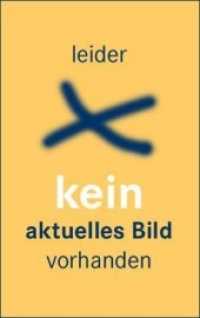基本説明
New in paperback. Hardcover was published in 2010. The present book details the most recent developments in this rapidly developing field. The articles in this volume - position papers and case studies - focus on some of the most critical issues in the field.
Full Description
Language documentation, also often called documentary linguistics, is a relatively new subfield in linguistics which has emerged in part as a response to the pressing need for collecting, describing, and archiving material on the increasing number of endangered languages. The present book details the most recent developments in this rapidly developing field with papers written by linguists primarily based in academic institutions in North America, although many conduct their fieldwork elsewhere. The articles in this volume — position papers and case studies — focus on some of the most critical issues in the field. These include (1) the nature of contributions to linguistic theory and method provided by documentary linguistics, including the content appropriate for documentation; (2) the impact and demands of technology in documentation; (3) matters of practice in collaborations among linguists and communities, and in the necessary training of students and community members to conduct documentation activities; and (4) the ethical issues involved in documentary linguistics.
Contents
1. Contributors; 2. Preface (by Furbee, N. Louanna); 3. Part 1. Praxis and values; 4. Language documentation: Theory and practice (by Furbee, N. Louanna); 5. The linguist's responsibilities to the community of speakers: Community-based research (by Rice, Keren); 6. Language documentation: Whose ethics? (by Macri, Martha J.); 7. Part 2. Adequacy in documentation; 8. Adequacy in documentation (by Berge, Anna); 9. Necessary and sufficient data collection: Lessons from Potawatomi legacy documentation (by Buszard-Welcher, Laura); 10. Documenting different genres of oral narrative in Cora (Uto-Aztecan) (by Vazquez Soto, Veronica); 11. Constructing adequate language documentation for multifaceted cross-linguistic data: A case study from the Virtual Center for Study of Language Acquisition (by Lust, Barbara); 12. Part 3. Documentation technology; 13. Valuing technology: Finding the linguist's place in a new technological universe (by Good, Jeff); 14. Using the E-MELD School of Best Practices to create lasting digital documentation (by Boynton, Jessica); 15. Sharing data in small and endangered languages: Cataloging and metadata, formats, and encodings (by Thieberger, Nicholas); 16. Representing minority languages and cultures on the World Wide Web (by Golumbia, David); 17. Part 4. Models of successful collaborations; 18. Beyond expertise: The role of the linguist in language revitalization programs (by Gerdts, Donna B.); 19. Models of successful collaboration (by Dwyer, Arienne); 20. Working with language communities in unarchiving: Making the J. P. Harrington notes accessible (by Macri, Martha J.); 21. Saving languages, saving lives: Tojolabal (Mayan) language revival within a health research NGO (by Aguilar Mendez, Hermelindo); 22. Language documentation in the Tohono O'odham community (by Fitzgerald, Colleen M.); 23. Documentation of pragmatics and metapragmatics: Language shift and pragmatic change in the Hmong language in Wisconsin (by Burt, Susan M.); 24. Part 5. Training and careers in field linguistics; 25. Training graduate students and community members for native language documentation (by Maxwell, Judith M.); 26. Native speakers as documenters: A student initiative at the University of Hawai'i at Manoa (by Ajo, Frances); 27. part 6. Conclusion; 28. Language documentation and field linguistics: The state of the field (by Grenoble, Lenore A.); 29. Selected online resources; 30. Name index; 31. General index




